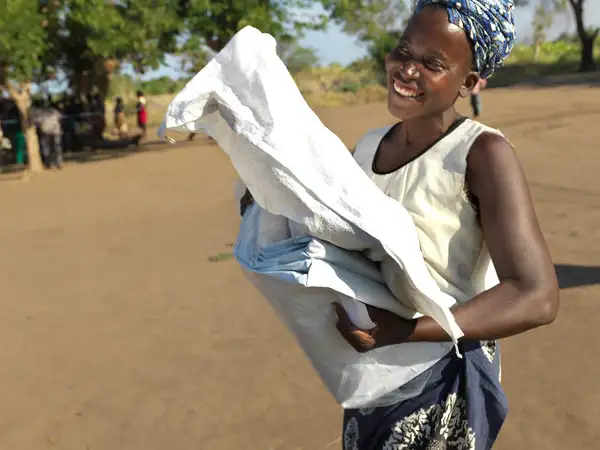

Luisa collected seeds and tools after Cyclone Idai devastated her farm in Mozambique.
Two years ago, Cyclone Idai tore through Mozambique, Zimbabwe, and Malawi, devastating towns and villages.
Thanks to your generosity, our frontline Church networks across Mozambique and Zimbabwe have reached vulnerable communities and helped them to rebuild two years on from the disaster.
You've helped people like Luisa, from a remote village in Mozambique, who collected seeds and tools after the cyclone hit to rebuild her farm.
Help us to respond to emergencies and rebuild afterwards
What happened when Cyclone Idai struck?
Cyclone Idai hit Mozambique, Zimbabwe and Malawi, in March 2019, destroying homes, roads, bridges and vital crops.
An estimated 1,000 people were killed, and more than three million were affected by the storm which destroyed crops, roads and bridges, homes, schools and health centres. Across the three countries, tens of thousands of people were made homeless.
“First the cyclone came and destroyed the house… The next day came the flood. We had to climb the trees and stay there for four days without food, drenched by relentless rain.”
Like so many affected by Cyclone Idai, Luisa relies on agriculture and natural resources for her living.
The impact of the cyclone jeopardised water and food sources. Contaminated water systems meant communities had to cope with outbreaks of cholera and other waterborne diseases.
How has CAFOD responded to Cyclone Idai?
When Cyclone Idai struck, your donations helped us to reach thousands of families in Mozambique and Zimbabwe with emergency assistance such as shelter kits, blankets, mosquito nets and soap.
Our local aid workers were on the front line of emergency response work.
When the cyclone hit they were already reacting through local Church networks, getting what provisions were available to communities in need.
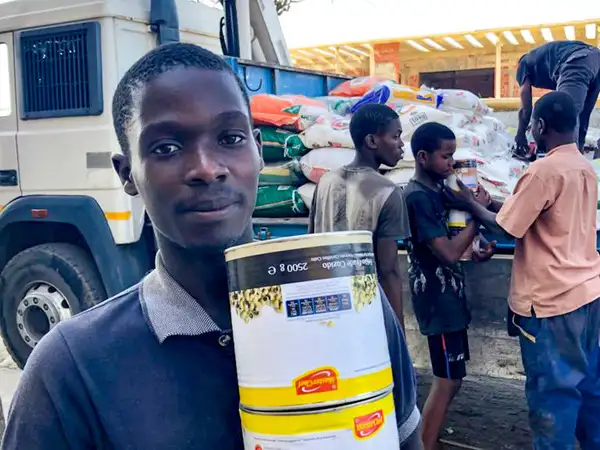

Thanks to our Church network and your donations, thousands of people have been reached with life-saving aid.
Reaching the people most in need has been possible because Catholics in England and Wales like you put their faith into action and raised over £2 million in donations.
These funds enabled our frontline aid workers to scale up their emergency response work, reaching more vulnerable families with the aid they needed, and in the two years since supporting families and communities as they started to rebuild their lives.
Mozambique
In Sofala, farmers like Luisa were provided with seeds and tools. Her local church network gave Luisa shelter materials and farming equipment, which has meant she can continue to grow food and provide for her family.
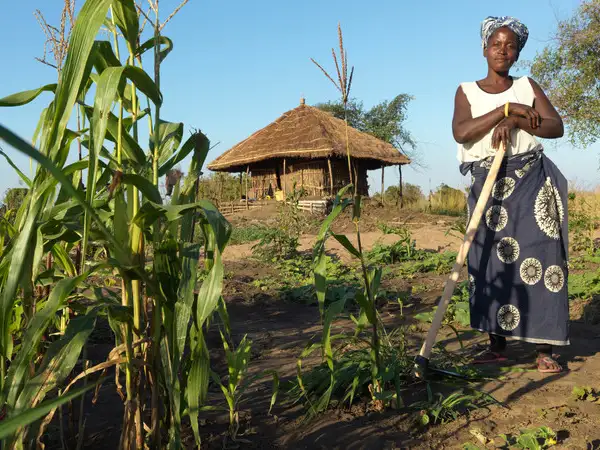

Luisa received tools and materials to help her grow crops and feed her family in the aftermath of Cyclone Idai.
In Beira and Nhamatanda work got underway to repair 18 classrooms, and replace backpacks and uniforms, so that more than 8,000 students could return to education.
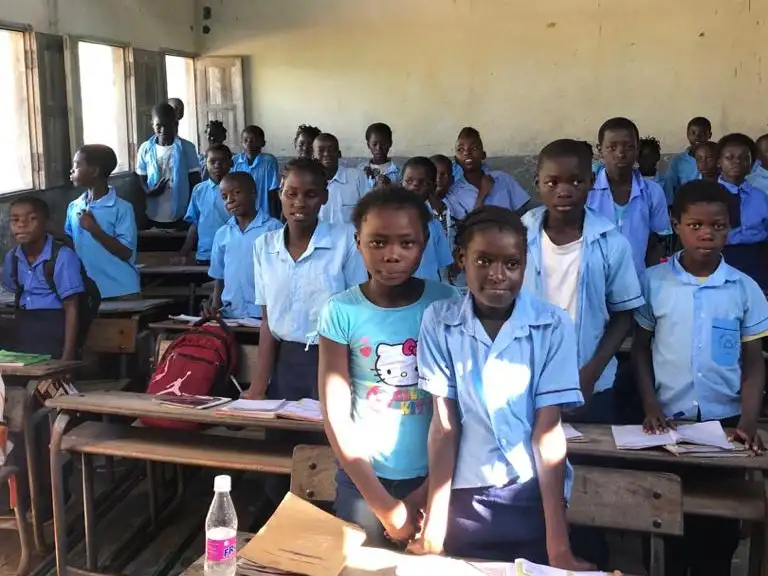

Across Beira and Nhamatanda 18 classrooms have been repaired, so more than 8,000 students can return to education.
In Mutua, our local experts organised a professional cutting and sewing course for 80 vulnerable women. At the end of the course each participant received a sewing machine, fabric, a wooden table and a chair.
Daily activities for children have also begun, helping to re-establish a sense of normality through a focus on playing, learning and socialising.
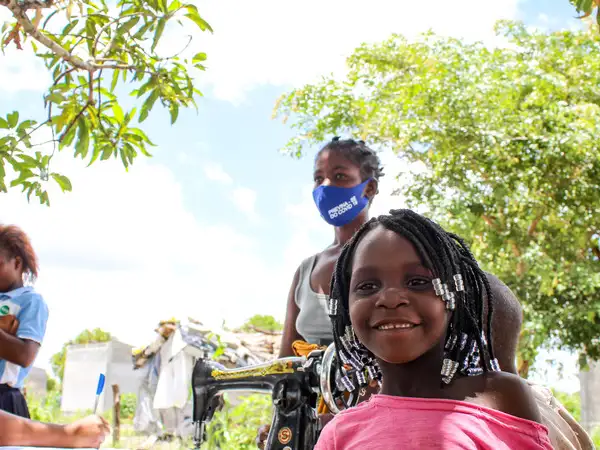

At an empowerment project in Mozambique started since Cyclone Idai struck, women have learned to sew clothes for themselves and their families.
As communities face the challenges of reconstruction and starting over, supporting families to be better prepared for future climate shocks is at the heart of our longer-term response in Mozambique. Training on how to prepare for disasters is underway, and can help to save lives during a future crisis.
Some families still needed the basics. Your help has meant that 3,500 families in Mozambique have been given shelter kits, mattresses, kitchen items, buckets, soap and water-purification tablets.
Zimbabwe
In Chimanimani and Buhera districts, in eastern Zimbabwe, flood waters cut off communities. Our experienced aid teams continue to work with communities as they face the challenge of rebuilding their lives.
Vital water sources were destroyed in these areas, and it has been a priority to repair boreholes, protect water sources and build new wells. This work has given more than 40,000 people clean, safe water.
Farming is a way of life in this area, and many farming families lost everything to the flood waters. Seeds and agricultural advice, to kick start the next planting season, have been shared with 720 farmers.
How have families been affected by Cyclone Idai?
There is still much work to do as families start to move back to their villages. It is not just a matter of rebuilding homes - infrastructure such as roads, bridges, schools and hospitals also have to be reconstructed.
As well as delivering vital aid, our presence on the ground, responding to the needs of vulnerable families, has also fostered a sense of hope - that despite the challenges ahead, families will able to face the future and start to rebuild their lives.
Juan, 45, and his wife Anita, 34, were among the people caught up in the trail of destruction. At the time of the cyclone all their grandchildren were under three, with the youngest only four weeks old. They were able to survive thanks to emergency help from local Caritas aid workers.
“I had to grab my three-week old grandson as I thought he would drown. We ran to the school for shelter and had to stay there for four days.”
The family received tokens which could be exchanged for tarpaulins and emergency food aid.
Anita's nephew, Fernando Jose, 26, said: “Having a token is a better way. It is well organised and will give us a lifeline, which is good. We know we will get help with the token.”
Please keep the people affected by the floods in your thoughts and prayers
What impact has coronavirus had?
The spread of Covid-19 made the crisis situation more difficult.
While supporting the local emergency response, we have given hygeine kits containing soap and facial masks to homeless families. And we raised awareness of hygiene and sanitation as a way to prevent coronavirus with the population of temporary camps.
Was Cyclone Idai caused by climate change?
It isn’t yet possible to say that climate change is directly to blame for individual disasters such as Cyclone Idai or other major storms and floods. But scientists are warning us that the changing climate is making disasters more frequent and more severe.
What is clear is that climate change is hitting the world's poorest people the hardest. The communities which have contributed least to temperature rises are those who are least able to cope when disasters strike. This is fundamentally unjust.
To address this, we need to take more action more quickly. As we seek to plan a world after the coronavirus pandemic, we must tackle the other challenges that plague our common home including the pandemic of runaway climate change.
How did Church leaders respond after Cyclone Idai?
Bishops from Mozambique, Malawi, Zimbabwe and across Africa called for prayers and humanitarian aid following the deadly floods.
In a statement, Bishop Charles Kasonde of Solwezi, Chairman of the Association of Episcopal Conferences in Eastern Africa, called for people to “respond to the cry for humanitarian assistance in whichever way possible”.
He explained that the need for humanitarian aid was urgent. Thousands of people needed the most basic requirements for life - food, clean water and shelter. Some temporary shelters were already at capacity.
“I pray for encouragement to all those involved in rescue operations and humanitarian assistance that they may not tire of supporting their brothers and sisters who need them most during this difficult time,” said Kasonde.
“I also pray that our partners and people of good will who have always journeyed with us in both good and bad times may rise up to the call.”
Pope Francis said at the General Audience in St. Peter’s, Rome on Wednesday 20 March:
"In recent days, great floods have sowed mourning and devastation in various areas of Mozambique, Zimbabwe and Malawi. I express my pain and closeness to those dear people.
“I entrust the many victims and their families to the mercy of God, and I implore comfort and support for those affected by this calamity.”
Please keep the people affected by the floods in your thoughts and prayers

